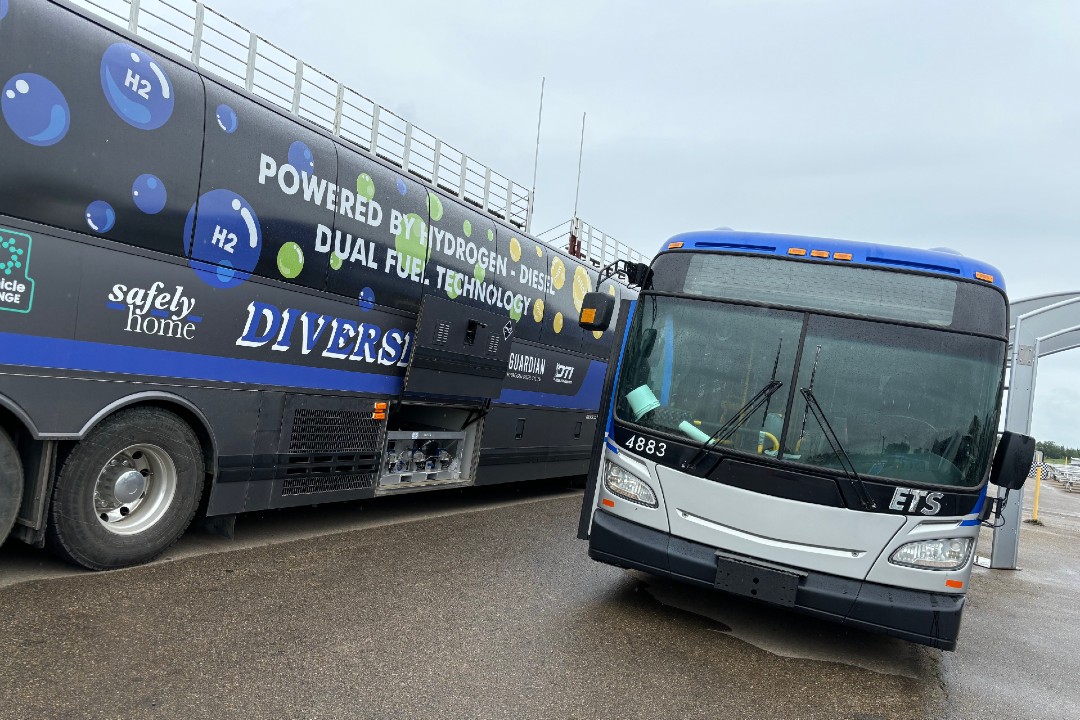A report released by Edmonton Global suggests Class 8 trucks are well suited to use hydrogen and could help create shipping corridors with lower carbon emissions than our present reality.
The report, prepared by Deloitte, says Class 8 trucks (such as dump trucks, cement trucks, and some semi-trucks with a gross vehicle weight rating that exceeds 14,969 kilograms) are compelling candidates for hydrogen because they are already on the market. The report also says hydrogen is more effective for Class 8 trucks than battery electric power. The report is framed as a state of affairs assessment for the Zero Emissions Vehicle Awareness Initiative, which sits within the larger 5,000 Hydrogen Vehicle Challenge,
Class 8 vehicles propelled by hydrogen, the report suggests, could be used on trucking routes that can act as hydrogen "corridors" so long as there are ample refuelling options and other hydrogen-supporting infrastructure. Edmonton to Calgary and Edmonton to Prince George are presented as potential corridors the Edmonton region could focus on.
"The report reinforced our approach to how we think we can be successful in developing hydrogen corridors in Western Canada," Edmonton Global's senior manager of brand strategy and communications, Sherri Bouslama, told Taproot in a statement. "(It) underscored the need to use a collaborative approach, which is what we are doing with the 5,000 Hydrogen Vehicle Challenge."
Alanna Hnatiw, mayor of Sturgeon County and chair of the Edmonton Region Hydrogen HUB, announced the 5,000 Hydrogen Vehicle Challenge during the 2023 Canadian Hydrogen Convention. The challenge's goal is to get 5,000 hydrogen or dual-fuel hydrogen vehicles on the road in Western Canada by 2028. Hnatiw said it's part of Canada's target to see 30,000 hydrogen-fuel vehicles in use by 2035. The challenge is led by Edmonton Global and includes partner municipalities, businesses, and industry associations.
Bouslama said Edmonton Global is "starting to see some momentum" on that goal. Evidence includes Nikola Canada, which has already sent one of its hydrogen trucks from Edmonton to Calgary and back as part of a pilot with the Alberta Motor Transport Association.
Outside the region, Wal-Mart Canada began using a hydrogen fuel cell-powered electric semi-truck in Ontario in June.
Infrastructure is also being built. Air Products is fuelling passenger vehicles at the Edmonton International Airport and plans to open its own refuelling station for commercial and passenger vehicles by 2025. Blackjacks Roadhouse in Nisku welcomed Alberta's first commercial hydrogen-refuelling station in March, supplied by Nikola Canada's HYLA energy brand.
Also in March, the City of Edmonton put an indefinite hold on plans to build its own hydrogen facility for buses and heavy-duty vehicles.
Still, Edmonton Global is optimistic about building fuelling infrastructure for corridors. "These are key to accelerating vehicle adoption," Bouslama said. "It's hard being the first person to jump into the pool so we commend these partners that are making these early investments into infrastructure. We have no doubt that as we go along, many more will 'dive in.'"
=
Both this Diesel Tech Industries coach and Edmonton Transit Service bus, photographed during a June 27 event at Rad Torque Raceway, use hydrogen to get around. They're examples of the potential for hydrogen-fuel adoption outlined in a new report for Edmonton Global and the 5,000 Hydrogen Vehicle Challenge. (Tim Querengesser)
But the report details how it's necessary to lower costs of supply and refuelling for hydrogen to achieve broader goals. Accurate as of May 2024, the average price of large-scale, low-carbon-intensity hydrogen is $14 to $35 per kilogram in Alberta and British Columbia. The report says that price needs to shrink to approximately $5.35 per kilogram.
Bouslama said part of achieving this will require ongoing partnerships between it, governments, and industry stakeholders. Those efforts are already underway, strengthened in part by the vehicle challenge's Hydrogen Mobility Champions Council. It includes representatives from Toyota Canada, Air Products, the airport, Diesel Tech Industries, Velocity Truck Centres, and more.
"We really need to have a partnership-based approach towards deployment of these vehicles … This is what's needed to break free of the chicken and egg syndrome," Bouslama said.
She also said Edmonton Global wants governments to create incentives for early adopters to reduce the financial risk associated with developing an early market for hydrogen. Incentives, she said, would offset the cost of hydrogen in the early stages of a transition, and prices would be expected to drop after those early stages.
The Deloitte report mentions that the airport has purchased 100 Toyota Mirai hydrogen fuel cell EVs and that the City of Edmonton has six. Still, the report does not focus on passenger vehicles adopting hydrogen.
The report does suggest B.C. and California's government incentives are noteworthy. Though Californians have been frustrated by the affordability and availability of hydrogen for passenger vehicles, bus users in and around Silicon Valley will get a taste of hydrogen vehicles soon. New Flyer, which supplies most of the Edmonton Transit Service bus fleet, announced a record-breaking sale of 108 hydrogen fuel cell electric buses to San Mateo County's public transit body on Oct. 21. They will serve that county, as well as Palo Alto and San Francisco, thanks in part to government funding and subsidies.
The City of Edmonton and Strathcona County's hydrogen bus pilot continues until at least January. Analysis of its success from the University of Alberta will follow.
